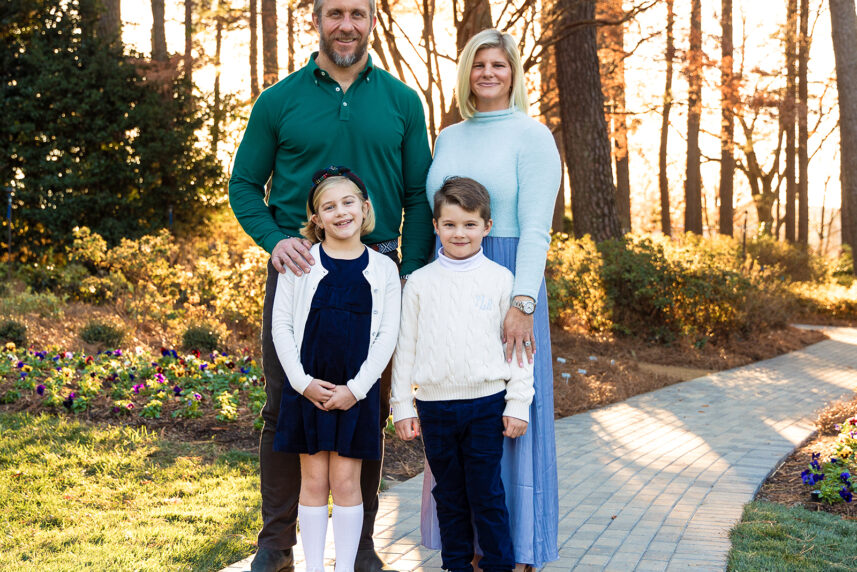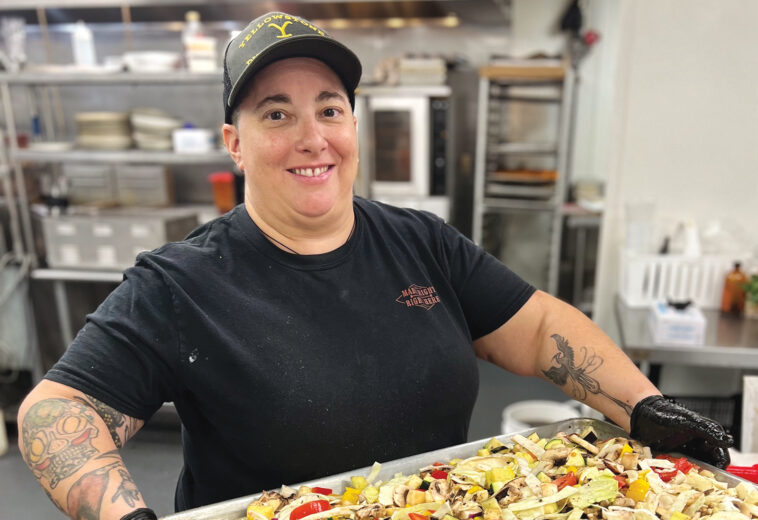Article:
BY KURT DUSTERBERG
Ted and Bre Larsen slip into a booth at the Panera location in North Hills, and before she even settles into place, Bre smiles and says, “There’s a lot of memories at this place.”
The Larsens are on their third adventure in Raleigh, each at a pivotal time in their lives together. They met in a business class at North Carolina State University. “We knew each other for a year or two from afar,” Ted says. “Toward the latter part of college we just connected, and we’ve been going strong ever since.”
After college, Larsen was drafted by the New England Patriots. A late-round pick, he was hardly a sure thing as an NFL prospect. Making things more difficult, he had just two years of experience as an offensive lineman after making the switch from the defensive line. So when Ted shared the news that he had been released during training camp, Bre wasn’t sure what was going on. “I naively thought you got drafted, and then we would be here for four years after you sign your rookie deal.”
The news was just a temporary setback for Larsen, who carved out a 12-year NFL career as a center and guard for the Tampa Bay Buccaneers, Arizona Cardinals, Chicago Bears and Miami Dolphins. He retired after the 2021 season and brought the family back to Raleigh, which serves as home while Ted attends Duke University’s Fuqua School of Business. Best of all, it allows their children—Charlotte is 8, and Theodore Jr. (“Tank”) is 6—to have their chapter in the place where the family story began.
“It just felt right bringing our kids back here,” Bre says.
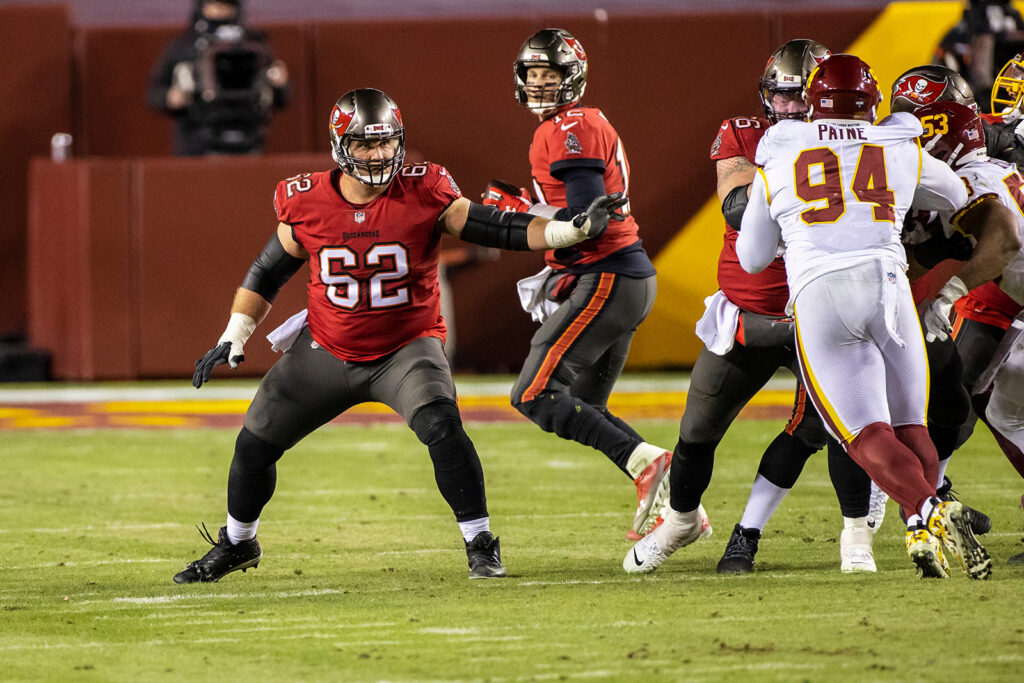
You were recruited to the Wolfpack from the Tampa Bay area, and you played your first two seasons on the defensive line. Then in your junior year you moved to the offensive line. How did that come about?
Ted: I was recruited by [Coach] Chuck Amato. When Tom O’Brien came in [in 2008], he had a different style of defense that I wasn’t necessarily suited for, and he saw some value for me on the offensive line. They helped me make that transition. It took a couple of years to really get comfortable. Even when I got to the NFL, I was still pretty fresh. I felt like I could bring my athleticism and my knowledge of football and try to flip to the other side of the ball.
What memories stand out for you playing for the Wolfpack?
Ted: The Carolina games, obviously. And early in my career we had some big Thursday night wins against Florida State and Boston College when they were highly ranked.
When you went to training camp with New England, the Patriots were already a dynasty with Bill Belichick and Tom Brady. Did they make any lasting impressions on you?
Ted: They had 10 or 12 players that had all played a lot of football on the offensive line. Even being a draft pick, I knew my chance of making that team could be a longshot. Playing with Brady, he already had three Super Bowls. That was a little added pressure because I was still fairly new at playing center and learning the game. When I got cut and picked up on waivers by Tampa, that was kind of refreshing, like a rebirth. It was a younger team, and I was able to be free and play a style of ball that was better suited for me.
Bre, how did you react when he got cut?
Bre: At the root of it, I’m not a football fan. I’m a huge Ted fan. Our relationship has always been where I don’t ask a lot of questions. So I will never forget that text in the middle of the day during training camp, and he said, “I’m heading home.” I was shocked. I didn’t even know this was a possibility. We were 22.
Tampa Bay worked out well. You made 31 starts in four seasons.
Ted: After that I never got cut by a team in training camp, but it was an eye-opener. From thinking this could be over forever, and then going to my hometown team where I’m going to have a chance to play and contribute, it was pretty unbelievable. The first year we went 10-6, but we didn’t get to the playoffs.
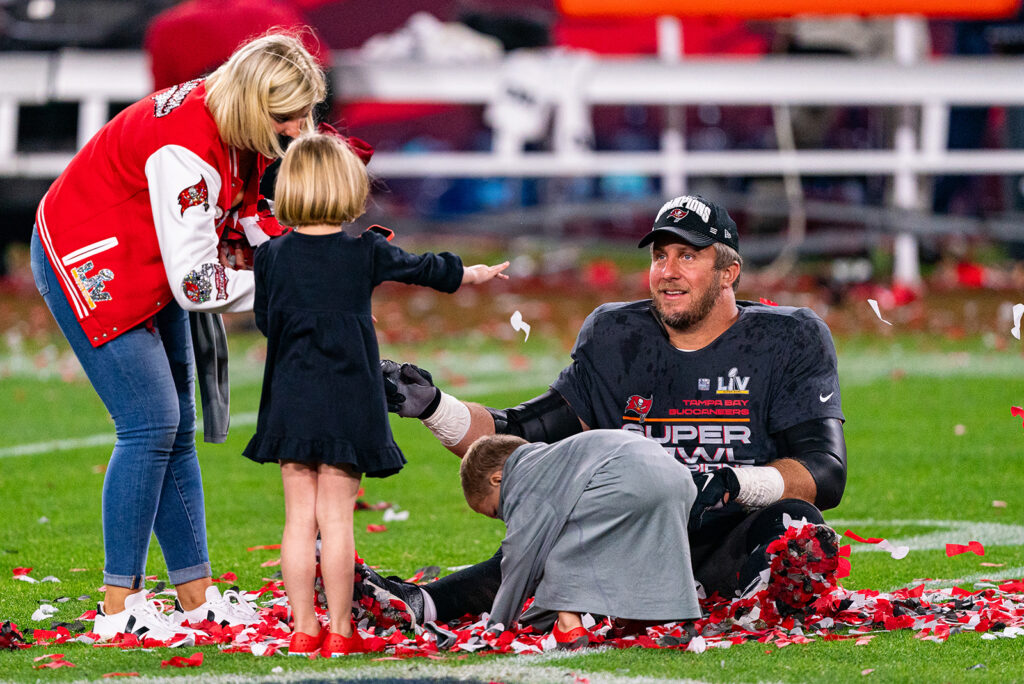
Then you signed with Arizona for two years in 2014.
Bre: We had gotten married before the season. That really became our home. We bought a house and solidified where we would come back to [for the offseason].
Ted: That first year we were 9-1 and kind of unstoppable, but [quarterback] Carson Palmer tore his ACL. We were on our third string quarterback going to the playoffs and lost to Carolina. The following year, we lost to Carolina again in the NFC Championship. We had two really strong teams that didn’t quite live up to their potential.
Bre: I think the component of me not really caring about the football aspect has saved me several times over, because I was never tied to the contracts or the wins and losses. I could focus on being a wife and a mom, just letting the chips fall where they were going to fall. The pressure was all on him. But in the second part of his career, there was definitely momentum.
After two seasons each in Miami and Chicago, you signed with Tampa Bay toward the end of the season. So you’re back with your hometown team and you’re back with Tom Brady, who’s signed with the Buccaneers—and you win a Super Bowl. That’s a pretty good way to wind down a career.
Ted: That was a weird year because I was a free agent, and that was the first year I hadn’t signed right away. While I didn’t contribute nearly as much as I did on other teams, it was like a redemption for some of the tough breaks I had earlier in my career.
And I have to ask, did Tom Brady remember you from your time together as a rookie with the Patriots?
Ted: I was COVID testing before I even had a workout and he was there testing on a day off, and he somehow recognized me from New England. I thought, this guy’s got to be like a robot. I was [with the Patriots] for such a brief amount of time, I thought there’s no way he remembers it.
Here he is, with GOAT [greatest of all time] status with six Super Bowls at that point. You would think that guys would be nervous to catch the ball. But he lowered himself down to that level and made everyone feel comfortable interacting with him. He needed those guys to catch the ball, to block and snap for him and feel like he’s just a teammate and not a mythical figure.
Can you describe what it’s like to play the offensive line? Most of us can’t even imagine what it’s like to play a position that is so violent, where there is such physical engagement on every play.
Ted: On the offensive line you have a certain assignment and responsibility, but it’s kind of dependent on what the other guy is doing. As I went along in my career I almost had a sixth sense of where pressures were coming, where guys were going. That helped the physical process.
I spent half my career as an undersized offensive lineman. I didn’t get up to 330 pounds until the second half of my career. The thing about the physicality of the offensive line is you rep it in the offseason, you rep it in training camp and it becomes almost second nature, but you can very definitely feel it the day after a game. That’s when you realize that it was a whole 70 or 80 plays against another 320-pound individual. I feel better now than when I was playing. I don’t think I realized how much those eccentric and isometric loads that you put on your body [affect you] when someone else is physically trying to defeat you. It’s such a part of your everyday life that you can’t measure the violence of it except in the postgame or feeling it postseason.
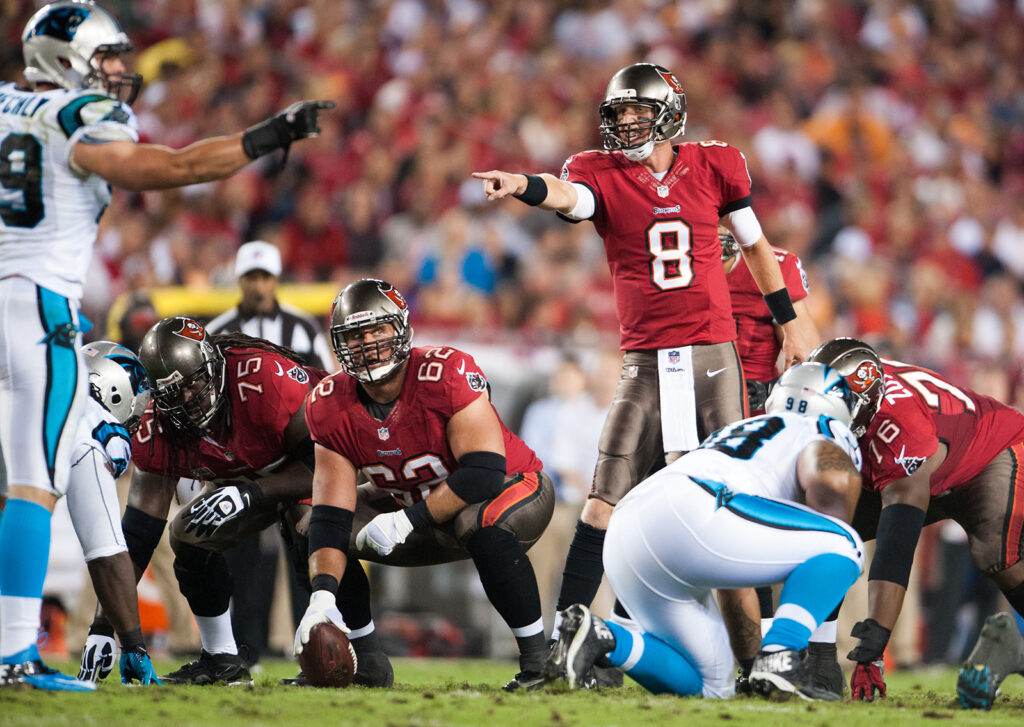
What kind of changes have you made from your football frame to your body today?
Ted: I’ve lost 80 pounds. This fitness journey since I’ve retired has been awesome. I’ve always enjoyed working out. I’ve always been into running and lifting. I’ve gotten really into skiing and biking. I lift every day, I do jiu jitsu a couple times a week. I’m mid-240s, and I was 330 at my heaviest. I went from a 44 waist to a 36.
Was it an obvious choice to come back to the Triangle for graduate school?
Ted: We had familiarity with the Triangle, and Duke was a no-brainer. Coming back to Raleigh, I didn’t realize how much it had changed. In my opinion it was still like a small town when I went to college here.
Bre: We always had great experiences in Raleigh. During the NFL lockout year [in 2011], we came back to Raleigh. Our apartment was right around the corner. We had many a breakfast sandwich at this Panera. We came here five or six days a week.
The kids don’t understand the feelings or the magnitude that goes with it. But Raleigh is really where our story started, and so much life has happened here. We knew [business school] would be a two-year stint, and his second career is more than likely to be out west.
How has the business school experience been so far?
Ted: I want to arm myself with all the tools I can use. I’ve never had a real job. I’ve played football my whole life. It’s been such a learning opportunity. I’ve interned with a lot of companies, a lot of start-ups, and just tried to get as many reps as I can get while in school. It’s been different than I thought it would be. I’ve wanted to have the knowledge to chase something, kind of climb a new mountain. I’m looking forward to entering the real world.
Here you are in your mid-30s, and you’ve already finished one career. How do you view your football when you look back?
Ted: To say that I changed positions at the end of my career at N.C. State and then I played 12 years in the NFL, it’s definitely longer than I thought. But I still feel so young, and I have a zest for life. I’m kind of excited for the next challenge. It’s a fun place to operate from right now.
